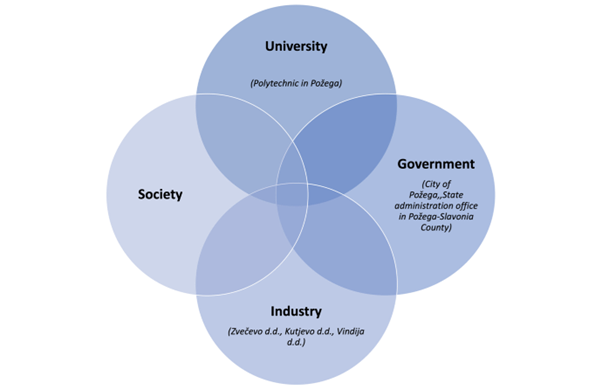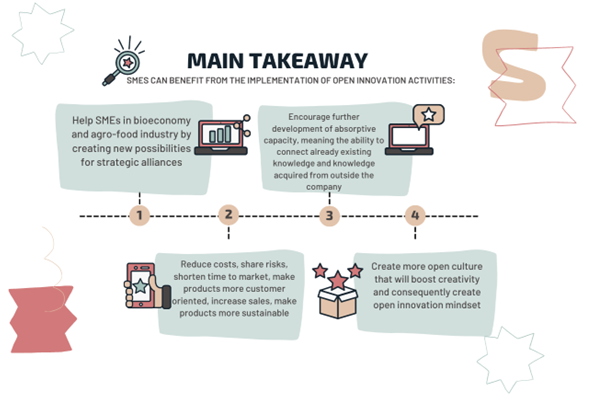|
|
Module 4: How to build mindset toward open innovation in your SME. |
|
|
Prof. Marina Dabić, Tena Obradović Posinković |
|
|
Open innovation mindset. Building an open innovation mindset can help SMEs in bioeconomy and agro-food industry to successfully implement open innovation activities, to ensure effective collaboration with external partners and to boost innovations. Consequently, an open approach to innovation could help SMEs in bioeconomy and agro-food industry to reduce product development costs, share risks with their partners, make products more customer-oriented and shorten time to market. With new advanced technologies in an already globalized world, SMEs in bioeconomy and agro-food industry face changes due to supply chains, and realize that their success also depends on external resources. At the same time, SMEs are more flexible and agile than large companies, thus can make decisions faster and adapt their business models. The implementation of open innovation encourages SMEs to expand their R&D processes, but without proper management of knowledge and trust, the innovation can remain unused. |
|
Upon completing this module, you should be able to: |
|
LOCAL CASE/EXAMPLE
The local example shows how the collaboration between University, Industry, Government and Society resulted in development of a new wine cellar, wine storages and wine. The main actor in this example is the Polytechnic of Požega, located at eastern part of Republic of Croatia. Polytechnic of Požega owns Department of Agriculture which is divided into Professional study of Viticulture-Oenology-Pomology and Professional study of Food Technology[38]. Additionally, Department of Agriculture have two special organizations: teaching base of Vineyard Cottage and Wine Storage and teaching facility of Wine Cellar and Laboratory.
The main goal of Viticulture-Oenology-Pomology study is to organize practical trainings for their students. In their teaching facility they own vineyards, wine cellar, laboratories, and all the necessary equipment. With experienced mentors, students are having professional training, and the collaboration between professionals and students resulted in development of wine. During their courses, students go through all the parts of wine production. At the end of their professional practice, students are producing their own wine. Polytechnic of Požega also collaborate with industry partners, for example with Kutjevo d.d. – the oldest Croatian winery with the tradition of more than 800 years. Next, they are transferring knowledge with food producers (Zvečevo d.d., Vindija d.d.) and many others. Moreover, Polytechnic of Požega actively participates in implementation of EU funded projects with the goal of knowledge transferring among students and professors, but also in order to create jobs in already uninhabited Slavonian region.
Small and medium-sized enterprises can profit from cooperation with the university, taking into account students and professors who have specific knowledge in the field. On the other hand, universities benefit because they have the opportunity to work on a real product and can collect data for their future research. Moreover, SMEs can benefit from this type of cooperation as they can encourage further cooperation with larger companies or other start-ups. To conclude, SMEs increase their R&D budget every year and play an important role in innovation systems. Through the implementation of inbound and outbound OI activities, small and medium enterprises benefit from the exchange of their knowledge, ideas and technology with external partners and make their production more sustainable.

